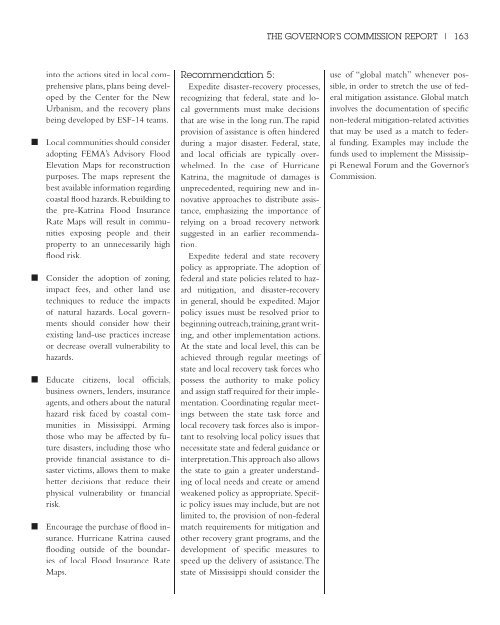Reports - Mississippi Renewal
Reports - Mississippi Renewal
Reports - Mississippi Renewal
- No tags were found...
Create successful ePaper yourself
Turn your PDF publications into a flip-book with our unique Google optimized e-Paper software.
THE GOVERNOR’S COMMISSION REPORT | 163into the actions sited in local comprehensiveplans, plans being developedby the Center for the NewUrbanism, and the recovery plansbeing developed by ESF-14 teams.■ Local communities should consideradopting FEMA’s Advisory FloodElevation Maps for reconstructionpurposes. The maps represent thebest available information regardingcoastal flood hazards. Rebuilding tothe pre-Katrina Flood InsuranceRate Maps will result in communitiesexposing people and theirproperty to an unnecessarily highflood risk.■ Consider the adoption of zoning,impact fees, and other land usetechniques to reduce the impactsof natural hazards. Local governmentsshould consider how theirexisting land-use practices increaseor decrease overall vulnerability tohazards.■ Educate citizens, local officials,business owners, lenders, insuranceagents, and others about the naturalhazard risk faced by coastal communitiesin <strong>Mississippi</strong>. Armingthose who may be affected by futuredisasters, including those whoprovide financial assistance to disastervictims, allows them to makebetter decisions that reduce theirphysical vulnerability or financialrisk.■ Encourage the purchase of flood insurance.Hurricane Katrina causedflooding outside of the boundariesof local Flood Insurance RateMaps.Recommendation 5:Expedite disaster-recovery processes,recognizing that federal, state and localgovernments must make decisionsthat are wise in the long run. The rapidprovision of assistance is often hinderedduring a major disaster. Federal, state,and local officials are typically overwhelmed.In the case of HurricaneKatrina, the magnitude of damages isunprecedented, requiring new and innovativeapproaches to distribute assistance,emphasizing the importance ofrelying on a broad recovery networksuggested in an earlier recommendation.Expedite federal and state recoverypolicy as appropriate. The adoption offederal and state policies related to hazardmitigation, and disaster-recoveryin general, should be expedited. Majorpolicy issues must be resolved prior tobeginning outreach, training, grant writing,and other implementation actions.At the state and local level, this can beachieved through regular meetings ofstate and local recovery task forces whopossess the authority to make policyand assign staff required for their implementation.Coordinating regular meetingsbetween the state task force andlocal recovery task forces also is importantto resolving local policy issues thatnecessitate state and federal guidance orinterpretation. This approach also allowsthe state to gain a greater understandingof local needs and create or amendweakened policy as appropriate. Specificpolicy issues may include, but are notlimited to, the provision of non-federalmatch requirements for mitigation andother recovery grant programs, and thedevelopment of specific measures tospeed up the delivery of assistance. Thestate of <strong>Mississippi</strong> should consider theuse of “global match” whenever possible,in order to stretch the use of federalmitigation assistance. Global matchinvolves the documentation of specificnon-federal mitigation-related activitiesthat may be used as a match to federalfunding. Examples may include thefunds used to implement the <strong>Mississippi</strong><strong>Renewal</strong> Forum and the Governor’sCommission.




